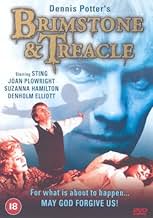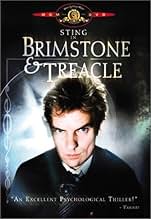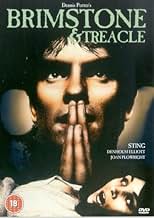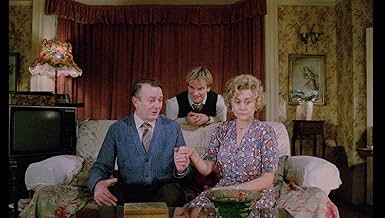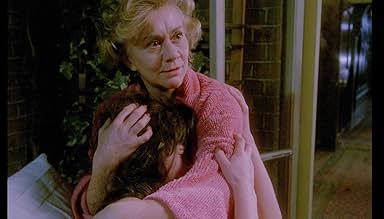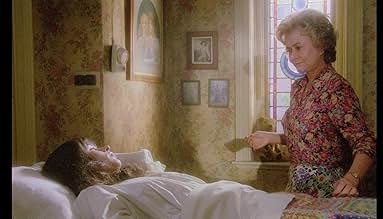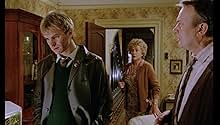CALIFICACIÓN DE IMDb
6.4/10
1.8 k
TU CALIFICACIÓN
Un extraño joven tiene un efecto siniestro en la familia de un escritor de mediana edad.Un extraño joven tiene un efecto siniestro en la familia de un escritor de mediana edad.Un extraño joven tiene un efecto siniestro en la familia de un escritor de mediana edad.
- Premios
- 1 premio ganado y 2 nominaciones en total
Opiniones destacadas
33. BRIMSTONE AND TREACLE (thriller-drama, 1982) Martin (Sting) befriends middle-aged bookkeeper Tom (Denholm Elliott). Martin cons his way into his house by passing himself as friend to his daughter. Daughter Patricia has been left a mute and bedridden for 3 years after a mysterious car accident. Though Tom is suspicious of Martin's exact motives, his wife is beguiled by Martin's charm. But what they don't know is that Martin is sexually abusing their defenseless and disabled daughter.
Critique: Part fairy tale, part religious parable, this creepy, atmospheric film is highlighted by a wickedly perverse turn by Sting (lead singer of rock group 'The Police'). What makes his character such a bizarre figure is that his motives are unknown, his appetites unresolved.
I think Martin is just a thief, passing himself as anyone's friend just to have a place to stay. A sort of pickpocket. He's also a sexual deviant who doesn't mind how he gets it, either from an invalid or an old woman. The film portrays him as an avenging angel-type, brought into this deeply secular home as a purger of sins.
Interesting direction by Richard Loncraine (is this his film debut?) who works from a play adapted by Dennis Potter, whose own sexually dubious works are to be questioned.
'The Police', along with 'The Go-Gos' provided the 'hip' soundtrack.
Critique: Part fairy tale, part religious parable, this creepy, atmospheric film is highlighted by a wickedly perverse turn by Sting (lead singer of rock group 'The Police'). What makes his character such a bizarre figure is that his motives are unknown, his appetites unresolved.
I think Martin is just a thief, passing himself as anyone's friend just to have a place to stay. A sort of pickpocket. He's also a sexual deviant who doesn't mind how he gets it, either from an invalid or an old woman. The film portrays him as an avenging angel-type, brought into this deeply secular home as a purger of sins.
Interesting direction by Richard Loncraine (is this his film debut?) who works from a play adapted by Dennis Potter, whose own sexually dubious works are to be questioned.
'The Police', along with 'The Go-Gos' provided the 'hip' soundtrack.
7jlaw
The film is re-make of a television play which the BBC chose not to transmit because of its controversial subject matter, in particular the final sequence of rape. This version which received a cinema release, appeared 6 years later, and included one member of the original cast, Denholm Elliot.
The central role of Martin was re-cast with Sting (then lead singer with The Police) who also provided music material, including his first solo single Spread A Little Happiness. (Michael Nyman also provided soundtrack material.)
The script remains largely faithful to the original screenplay, though several minutes of discourse in one of the final scenes is excised completely. This is a discussion of racism which provokes Mr Bates to retract from his outspoken racist views.
The original TV play is set mostly within the confines of a living room, while the
bigger-budget movie is less restricted, and has a Gothic, sinister atmosphere. References to Martin's diabolical nature are more subtle too the TV play shows Martin with hairy, clawed feet. The closing scene of the film suggests that Martin may have been caught out (by an angel or devil?), while the TV play implies that his actions within the Bates household are just one of many continuing abuses on a never-ending cycle.
The central role of Martin was re-cast with Sting (then lead singer with The Police) who also provided music material, including his first solo single Spread A Little Happiness. (Michael Nyman also provided soundtrack material.)
The script remains largely faithful to the original screenplay, though several minutes of discourse in one of the final scenes is excised completely. This is a discussion of racism which provokes Mr Bates to retract from his outspoken racist views.
The original TV play is set mostly within the confines of a living room, while the
bigger-budget movie is less restricted, and has a Gothic, sinister atmosphere. References to Martin's diabolical nature are more subtle too the TV play shows Martin with hairy, clawed feet. The closing scene of the film suggests that Martin may have been caught out (by an angel or devil?), while the TV play implies that his actions within the Bates household are just one of many continuing abuses on a never-ending cycle.
A middle class commuter belt couple Mr Bates (Denholm Elliot) and Mrs Bates (Joan Plowright) are duped into taking a charming young man Martin(Sting)into their house to help care for their catatonic daughter (Suzanna Hamilton). Martin claims to have been close to their daughter before an accident left her unable to communicate. As the film progresses the couple mistakenly start to trust Martin and dark family secrets are revealed.
Originally a stage play written by Dennis Potter the film is in turn engrossing, disturbing and claustrophobic. Denholm Elliot is as ever brilliant as the lonely and disturbed father figure, Sting puts in a good performance as a strange and demonic young man, Joan Plowright is very good as the maternal and naive housewife.
The two slight let downs for me were the music which I did'nt feel fitted in well with the film and the main fantasy sequence which did'nt stand the test of time well.
Other than that the film held my attention throughout, the direction by Richard Loncraine was extremely capable, all in all an intriguing and idiosyncratic piece which is well worth a watch.
Originally a stage play written by Dennis Potter the film is in turn engrossing, disturbing and claustrophobic. Denholm Elliot is as ever brilliant as the lonely and disturbed father figure, Sting puts in a good performance as a strange and demonic young man, Joan Plowright is very good as the maternal and naive housewife.
The two slight let downs for me were the music which I did'nt feel fitted in well with the film and the main fantasy sequence which did'nt stand the test of time well.
Other than that the film held my attention throughout, the direction by Richard Loncraine was extremely capable, all in all an intriguing and idiosyncratic piece which is well worth a watch.
Polite, mannered drifter Martin Taylor (Sting) charms his way into the home of Thomas Bates (Denholm Elliott), an outwardly upright publisher of religious text, his simple-minded, devout wife Norma (Joan Plowright) and their catatonic daughter Patricia (Suzanna Hamilton), whom he claims to know. Martin is allowed to stay in the home for a couple of days, cooks, cleans, "cares" for the daughter and tries to help the couple through their marital problems, but he's also the catalyst that forces some dark secrets out of the family closet.
Sting's character will either annoy or fascinate you as he exists solely as an enigma, representing angel or demon, or possibly both. Originally a play, this film never quite escapes the stage, but that only feeds into the claustrophobia of the stuffy household and guilt-ridden, lonely characters who inhabit it, and, all in all, it's an intriguing allegory on the nature of good and evil that has a lot to offer, including potent religious imagery, a knockout nightmare/fantasy sequence and a good score (plus songs by The Police) all driven home by excellent performances by the three leads and assured direction by Richard Loncraine.
Dennis Potter's script was previously filmed in 1976 for BBC (that version also starred the great Denholm Elliott).
Sting's character will either annoy or fascinate you as he exists solely as an enigma, representing angel or demon, or possibly both. Originally a play, this film never quite escapes the stage, but that only feeds into the claustrophobia of the stuffy household and guilt-ridden, lonely characters who inhabit it, and, all in all, it's an intriguing allegory on the nature of good and evil that has a lot to offer, including potent religious imagery, a knockout nightmare/fantasy sequence and a good score (plus songs by The Police) all driven home by excellent performances by the three leads and assured direction by Richard Loncraine.
Dennis Potter's script was previously filmed in 1976 for BBC (that version also starred the great Denholm Elliott).
This film was never around much at the time of it's release dispite some good word of mouth. It is pretty well brought off in every way, but leaves one feeling one has seen a rather more obvious version of Pinter with then trendy rock and an even more pronouced lack of point.
Sting holds his own surprisingly well with his classy co-stars.. It's Potter's heavy handed irony, admittedly popular, that just tires you out.
Sting holds his own surprisingly well with his classy co-stars.. It's Potter's heavy handed irony, admittedly popular, that just tires you out.
¿Sabías que…?
- TriviaDavid Bowie was the first choice to play Martin Taylor.
- Créditos curiososOpening credits are listed on the pages of a book floating on moving water.
- ConexionesFeatured in Zomergasten: Episode #10.5 (1997)
Selecciones populares
Inicia sesión para calificar y agrega a la lista de videos para obtener recomendaciones personalizadas
- How long is Brimstone & Treacle?Con tecnología de Alexa
Detalles
- Fecha de lanzamiento
- País de origen
- Idioma
- También se conoce como
- Brimstone: Inkräktaren
- Locaciones de filmación
- Productoras
- Ver más créditos de la compañía en IMDbPro
- Tiempo de ejecución
- 1h 27min(87 min)
- Color
- Mezcla de sonido
- Relación de aspecto
- 1.66 : 1
Contribuir a esta página
Sugiere una edición o agrega el contenido que falta


